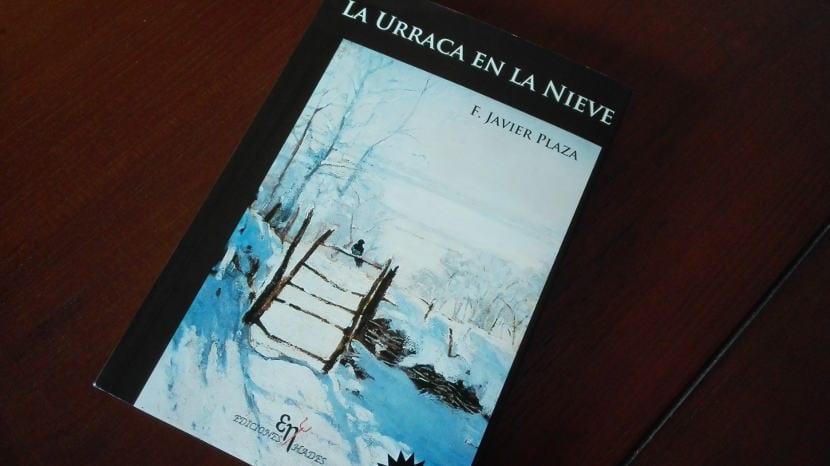
A couple of months ago I told you about Magpie in the snow, the first novel by F. Javier Plaza, published by Hades Publishing. It's been a couple of weeks since I finished reading it. And if I have not encouraged myself to do the review before, it is because I have not yet fully recovered from the impression that this story has left on me.
Magpie in the snow It takes place over 7 days, in the most artistic Paris of the late XNUMXth century. In those days we get to know Camille, its protagonist, a young man from a good family who wants to become a painter above all else, but whose family obligations do not make it easy for him. We discover who he is, his entire history and that of those around him, his dreams, his desires, his ambitions. But also his frustrations, his ties, his doubts, his fears. Plaza enters Camille's mind as a painter, as a man, as a son, as a lover, as an artist, as a young man who wants to fight his destiny to carve out his own, but only partially succeeds.
I would say that Magpie in the snow it is a novel narrated as a memoir. In the first person, Camille recounts his last days in Paris, before returning to the family home, where he will have to fulfill his obligations as an eldest son, including marrying his fiancée.
However, what at first seems like a diary, little by little it acquires that form of memories, when it begins to perceive that it is written from the future. And as you become aware of this, the reader can realize that all of Camille's dreams can remain only in that, in dreams, among them, returning to Paris again in spring to exhibit with the Impressionists in an important appointment pictorial.
For me that doubt, that feeling, turned into pure agony. So much so that I did something that I had never done in my life. I stopped reading the book to a chapter from the end for several days because I could not bear the pain of discovering that the ending that I had been anticipating from so many pages ago could happen.
Plaza manages to create a character with whom it is very easy to empathize. Despite being a womanizer and even a hypocrite - in the way he portrays men of the time, nothing unusual, on the other hand - Camille has a dream and fights for it. He is a product of his time that wants to break out of the mold, but his beliefs are consistent and he has to fight against himself. Duty to others and owing to oneself triggers in him a mental struggle from which interesting ideas and reflections emerge.
Parisian inspiration
Javier Plaza is a lover of painting. Impressionism is his favorite pictorial movement. And you can see it. The passion that emerges from the pages of Magpie in the snow when describing a painting or a scene that one of the characters thinks about painting, I even asked the author of the book if those paintings really existed.
But not. Except the picture Magpie in the snow of Monet, few are the real pictures that are mentioned in the novel. Javier told me that he talks about these hypothetical paintings thinking about what “a painter might find interesting for his work”, and that he tried to get into his head as happens to him when something happens to him or he sees something and thinks “that he could give for a written text ».
I liked a detail that he told me about the character of Camille that, although he is not inspired by any real character, Plaza gave him that name in homage to Camille Pisarro, one of his favorite painters. In fact, Plaza's favorite canvas is precisely Pissarro, Boulevard de Montmartre at sunset. And it is precisely in Montmartre where the main story takes place.
Another noteworthy curiosity is the inspiration of the other characters in the book, Yves and Victor, important painters whom Camille befriends and who discovered impressionism for her. Plaza that said that Yves is inspired by Toulousse Lautrec, although the life of the painter, especially in his later years, was quite degraded and dramatic, and he removed any trace of tragedy from the character of Yves to make it joyful. Victor has features of Pisarro.
These two characters accompany Camille to represent the two antagonistic personalities of the artist. Yves is the absent, bohemian artist of his time who lives only for painting and the night. And Víctor is the serene, family-oriented artist with social concerns.
The body passes and the glory remains
This phrase is said by Yves to Camille. The doubt as to whether or not Camille will make her dream come true is already more than evident when Yves speaks these words. Although the phrase is released by the painter as one who does not want the thing, between jokes and ridicule, the truth is that the idea is really deep.
When I came across this phrase is when I really became aware of the tragedy that was coming: the difference between going through life and dying, or living and staying in the memory forever. I will remember this book for many things, but I know that this idea will always be with me.
There are many reasons why it is worth reading Magpie in the snow, but if I had to choose only one, it would certainly be to live this phrase.